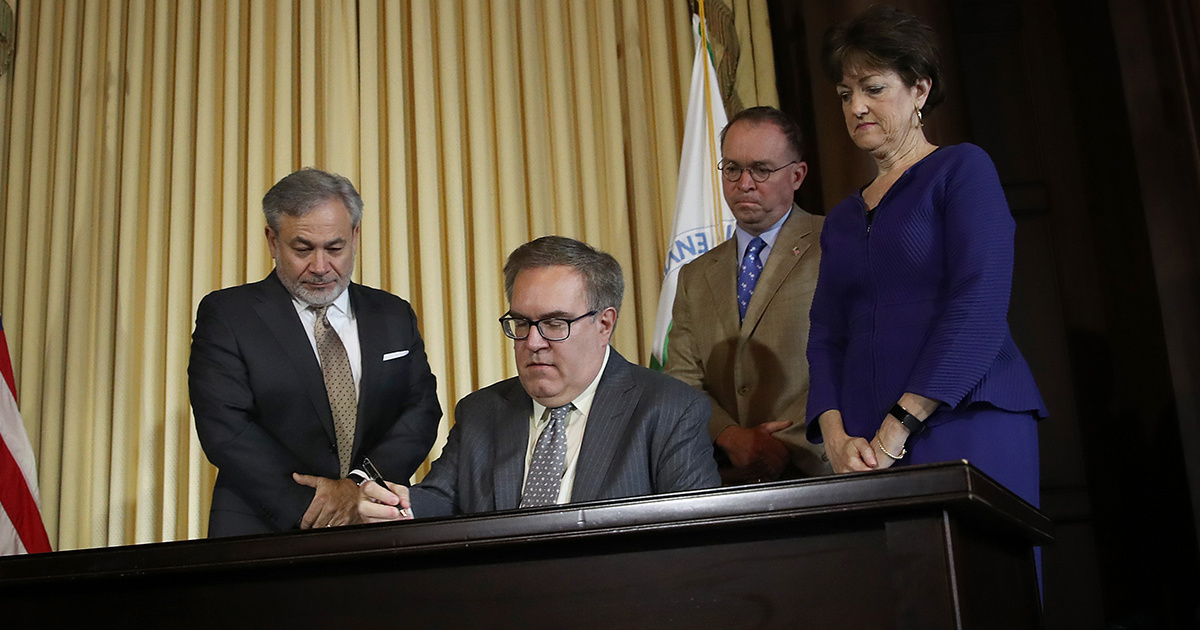

EPA Administrator Andrew Wheeler signs his replacement for the Clean Power Plan. Win McNamee / Getty Images
Former coal lobbyist and Trump-appointed U.S. Environmental Protection Agency (EPA) Administrator Andrew Wheeler signed a rule Wednesday that officially replaces the Obama-era Clean Power Plan with a new regulation that Wheeler said could lead to the opening of more coal plants, the Associated Press reported.
While the Obama administration plan would have established national limits on greenhouse gas emissions and mandated utilities move away from coal, the Trump administration’s Affordable Clean Energy Rule allows states to decide whether and how much to reduce emissions, The New York Times explained.
“I don’t know who is going to invest in a new coal fired power plant, but we’re leveling the playing field to allow that investment to occur,” Wheeler said, as The New York Times reported.
In Case You Missed It – Watch the major policy announcement made this morning where @EPAAWheeler EPA Administrator Wheeler, @WhiteHouse Chief of Staff Mulvaney, Members of Congress, states, labor unions, and others finalize the Affordable Clean Energy rule https://t.co/jz5OoFVDY6
— U.S. EPA (@EPA) June 19, 2019
The announcement was roundly criticized by environmental groups, and the attorneys general of California, Oregon, Washington State, Iowa, Colorado and New York all vowed to sue to stop it. Opponents say the plan does not do enough to reduce emissions at a time of growing climate crisis and puts more Americans at risk from air pollution.
The new rule would reduce electricity emissions by less than half of what experts say is needed to stop global temperatures from rising above two degrees Celsius, The Washington Post reported. And the EPA’s own initial estimate found the new rule would lead to between 470 and 1,400 premature deaths a year by 2030 due to increased particulate matter pollution. The new rule also comes as U.S. greenhouse gas emissions began to rise again in 2018 after a three-year decline, according to The New York Times. It was also signed a day after the Associated Press reported that U.S. progress on air pollution has stalled.
“This deadly rule rejects science in a groveling effort to satisfy the fossil fuel lobby,” Center for Biological Diversity senior attorney Clare Lakewood said in a statement to EcoWatch. “Trump’s EPA is hell-bent on propping up coal at the expense of human health, the survival of endangered species and a livable climate. But we’re confident this attack on our lungs and our planet won’t survive in the courts.”
BREAKING: We intend to sue the Trump Admin's @EPA over their #DirtyPower rule.
This is yet another prime example of this administration's attempt to rollback critical regulations that will have devastating impacts on both the safety & health of our nation.
— NY AG James (@NewYorkStateAG) June 19, 2019
However, some legal experts told The New York Times there is a danger in suing to stop the rule. The Obama administration’s plan assumed that the EPA had the power to regulate greenhouse gas emissions on the national level, while the Trump administration plan argues it can only regulate environmental violations at individual plants. If the Supreme Court rules in favor of the Trump administration plan and interpretation, it could restrict what future presidents are able to do to fight climate change under existing law.
“It could foreclose a new administration from doing something more ambitious,” Harvard University environmental law professor and Obama administration legal counsel Jody Freeman told The New York Times.
The Clean Power Plan itself was suspended by the Supreme Court after it was challenged by hundreds of companies and 28 states.
Bracewell LLP partner Jeff Holmstead, who led the EPA’s air office under President George W. Bush, recommended pushing Congress to pass climate legislation.
“If Trump isn’t reelected and the next president makes climate change a priority, I think there’s a good chance that we’ll see a climate change bill enacted into law, even if Republicans control both houses of Congress,” Holmstead told The Washington Post.
Some argued that the electricity sector is shifting away from coal despite the administration’s attempts to boost the power source.
Beyond Carbon, former New York City Mayor Michael Bloomberg’s new initiative to shut down all U.S. coal plants by 2030, acknowledged the damage that could be done by the Trump administration’s plan while also arguing that it could not stop the national shift away from fossil fuels. Campaign manager Brynne Craig explained in a statement to EcoWatch:
“Each passing month brings new evidence of the climate crisis and the Trump Administration continues to demonstrate its contempt for science and its subversion of fact-based environmental policies. By scrapping the Clean Power Plan, our country’s first ever attempt to cut carbon pollution at the national level, President Trump has weakened climate and air pollution standards and threatened the health and safety of Americans.
“Yet the Trump Administration’s attempts to revive obsolete industries like coal have proven futile: since he has taken office, over 50 coal plants have closed, putting us over halfway to retiring the U.S. coal fleet and showing the undeniable momentum among U.S. markets, organizations, and communities in moving off of dirty, deadly, and costly fossil fuels. American cities, states, and businesses are also inspiring great hope with their work to combat the climate crisis, regardless of the federal government. Beyond Carbon will accelerate these efforts and further the country’s transition toward a clean energy future.”
DTE Chairman and CEO Gerry Anderson told The Washington Post the plan would not change his pledge to cut emissions 80 percent by 2040 and close 14 of 18 coal plants by 2030.
“The industry’s in motion, and it’s got its own life,” Anderson told The Washington Post. “We’re moving on, and the rest of the industry is in a similar direction.”
- Trump's EPA Is Changing Its Math to Make Clean Power Plan ...
- Appeals Court Hears Arguments on Trump's Clean Air Rollback - EcoWatch

 233k
233k  41k
41k  Subscribe
Subscribe 